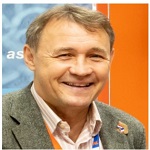Home - INVITED SPEAKERS
Giane Favretto is currently a professor at higher education institutions in human health courses in the city of Curitiba, Brazil. She has a degree in Pharmacy from the Pontifical Catholic University of Paraná. Favretto received her Master's and Ph.D degree in Microbiology, Parasitology and Pathology from the Federal University of Paraná, in which she researched and published studies with extracellular vesicles and uremic toxins in the context of chronic kidney disease. She also has experience with clinical analysis, cell culture, and molecular biology.

Dr. Peter A. Behnisch is Director of BioDetection Systems BV in Amsterdam (The Netherlands) since 2006. He is involved in NAM testing of POPs (dioxins, PCBs, PFAS) and endocrine disrupting chemicals (plastic additives, pesticides and cosmetics) since his PhD in 1993 at the Eberhard-Karls University of Tübingen, Germany. He worked and published many studies in these topics in several countries such as a) Postdoc in Lancaster University, England (1997); b) Postdoc at Kyoto University as well as Bioanalysis group leader at Kaneka Techno Corp. in Japan (1998-2002); c) Head of Laboratory at SGS in Wismar (Germany), Hamburg (Germany) and Ludington, Grand Rapid (USA) from 2002 to 2004 as well as d) Head of Laboratory at Eurofins GfA in Muenster/Westfalen and Hamburg (Germany; 2004-2006). His scientific expertise is in chemical and biological analysis of all kinds of chemical (POPs, EDCs, PFAS, BFRs) and biological relevant pollutants/mixtures. He is involved in many international projects about chemical and biological ultra-trace analysis for environment, food, chemicals and public health. He is member in several expert groups (e.g., ISO) as well as national advisor related to dioxins/PCBs and endocrine disrupters. He is author from more than 130 peer-reviewed international publications, as well as several book chapters.

Dr. Güzin EMECEN received her BS, MS and PhD degrees from Hacettepe University (Ankara/ Turkey) Biology Department. She completed his Master's Thesis on "Investigation of the Mutagenic Effects of Pesticides in Mammals with the Micronucleus Test System"in 1991. She completed his doctoral thesis on “Prevention of Genetic Damages Caused by Ionizing Radiation in Drosophila melanogaster with Antioxidant Substances”. She has been working with genetic toxicology tests with different model organisms since1999. She conducted genotoxicity and antigenotoxicity studies with SMART(Somatic Mutation and Recombination Test) assay in Drosophila with plant extracts of Salvia, Melia, Lotus, Scutelleria, Echinophora genus and substances obtained from these extracts with different Faculties of Pharmacy. These studies will continue with as model organism Drosophila melanogaster and SMART (wing spot test) assay in Functional and Evolutionary Genetics Laboratory in Hacettepe University. Ongoing projects: -The Effect of Herbicide Application on Offspring Locomotor Behavior Depending on Maternal Age in Drosophila melanogaster -The Importance of Drosophila melanogaster as a Model Organism in Phytochemical Activity Bioassay For Neurological Diseases -Investigation of the Effects of Some Plant Originated Phenolic Compounds on Anti-Alzheimer's, Anti-Melanogenic and Skin Aging by In vitro, In vivo and In Silico Methods".

Oksana Gerzen works at the Institute of Immunology and Physiology UB RAS in Ekaterinburg, Russia, where she has made significant contributions to the field of physiology. She earned her Ph.D degree in Physiology from the Kazan Federal University. Oksana’s research focuses on several areas, including myocardium mechanics and structures at the molecular level, the influence of toxic ions on myocardium at the molecular level, and the influence of pharmacological drugs on cardiac and skeletal muscle. Her works have been widely published and have made significant contributions to understanding of these complex topics.
I am a Mexican psychiatrist. I have been working in neuroimage and clinical studies in patients on early psychosis. Our main work is based on image studies on drug-naïve patients in clinical high risk of psychosis and first episode of psychosis. Currently we work on image studies as biomarkers for antipsychotic response in these populations.